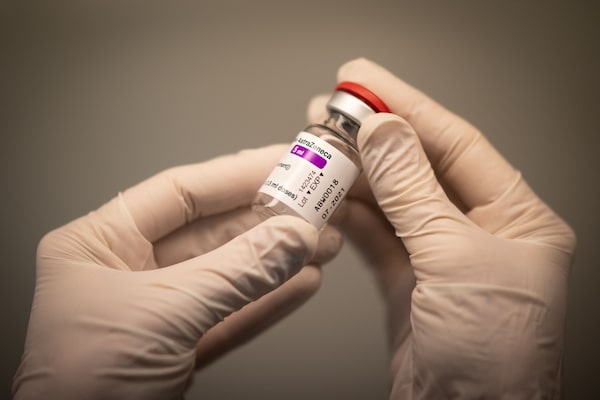
A pharmacist holds a vial of the Oxford-AstraZeneca COVID-19 vaccine, on March 25, 2021.LOIC VENANCE/AFP/Getty Images
The question:
I recently got my first dose of the AstraZeneca vaccine. But I am increasingly worried by the reports of blood clots linked to this COVID-19 vaccine. How do I know if I am at risk of developing a clot and when will I be in the clear?
The answer:
First and foremost, it’s important to keep in mind that vaccine-related blood clots are extremely rare.
According to the latest estimates, they occur in one out of every 50,000 to 100,000 people who get the Oxford-AstraZeneca vaccine in Canada, says Dr. Seema Marwaha, an assistant professor of internal medicine at the University of Toronto.
Can I get a different type of vaccine for my second dose?
Still, we shouldn’t play down the significance of the clotting condition, which has been dubbed vaccine-induced immune thrombotic thrombocytopenia, or VITT for short.
Depending on the location and severity of the clots, they can be fatal.
That means people who get an AstraZeneca shot (or the Johnson & Johnson vaccine, which can also cause VITT) should be looking for warning signs of clots so they can seek prompt medical attention if it’s needed.
The range of symptoms include:
- A severe headache that does not go away,
- Neurological problems such as blurred vision, difficulty speaking and seizures,
- Shortness of breath, chest pain, severe abdominal pain and severe back pain,
- Severe swelling, pain, colour changes or coldness in an arm or a leg; and
- Multiple small bruises, red or purple spots or blood blisters under the skin.
“If you think you’re having an emergency, then you should go to a hospital emergency department,” stresses Dr. Aikta Verma, chief of the department of emergency services at Sunnybrook Health Sciences Centre in Toronto.
If your symptoms are mild and you’re not sure what to do, seek the advice of a health care provider – such as your family physician – as soon as possible. Same-day virtual appointments are now an option for many patients, Dr. Verma says.
The clots tend to develop between four and 30 days after the vaccination, says Dr. Michelle Sholzberg, head of the division of hematology-oncology at St. Michael’s Hospital in Toronto.
If you’re symptom-free after 30 days, “the odds are that you are in the clear,” she adds.
Are COVID-19 vaccines messing with women’s menstrual cycles?
Doctors and scientists are still trying to figure out why the AstraZeneca and the Johnson & Johnson vaccines may cause VITT.
They say they believe the vaccines trigger an inappropriate immune reaction that leads to the production of antibodies that target platelets – the blood cells that play a key role in forming clots.
“You have lots of platelets in your circulatory system. Their job is to survey blood vessels and look for holes that need to be plugged,” Dr. Sholzberg says.
She adds the antibodies apparently bind to receptors on the platelets and turn them on like a switch. “The excessive activation of the platelets is what is responsible for driving the clot formation. The platelets just go berserk.”
A simple blood test that looks at platelet count can help to quickly determine if a patient has VITT.
In some respects, VITT resembles another condition that happens when some patients are given the blood thinner heparin. The drug, in rare cases, can also set off an inappropriate immune reaction leading to clot formation.
Fortunately, doctors know how to manage the heparin-induced condition and the same treatments can be used for VITT.
Patients are given certain types of blood thinners (but not heparin) to stop the clotting. They might also receive intravenous immunoglobulin, which “mops up” the antibodies that are causing the problem.
Dr. Marwaha says individuals with a previous history of blood clots – such as developing deep-vein thrombosis (DVT) in the leg after a long plane flight – are not necessarily at increased risk of getting VITT. That’s because the underlying causes of regular bloods clots are not the same as the mechanism behind VITT.
However, having one dose of AstraZeneca without developing clots doesn’t guarantee the second shot will be problem-free.
“There have now been cases of VITT identified after the second dose,” Dr. Sholzberg says. “So we can’t offer the reassurance that if you got your first dose and you were fine, you should be fine with your second dose.”
Even so, the potential side effects from the vaccine must be weighed against the risks posed by the new and highly contagious variants of the coronavirus that causes COVID-19, says Sabina Vohra-Miller, founder of the website Unambiguous Science.
“Every day that you delay taking the first available vaccine, is essentially an extra day that you could be exposed to COVID,” Ms. Vohra-Miller says.
All of the COVID-19 vaccines are highly effective in preventing serious disease, hospitalization and death.
It’s worth pointing out that one in five patients hospitalized with COVID-19 actually develops blood clots.
“I have looked after multiple patients who have had COVID-related strokes and COVID-related pulmonary embolisms [blood clots in the lungs],” Dr. Marwaha says. None of these patients had been vaccinated.
“So, your risk of getting a serious clot from COVID is significant.”
Paul Taylor is a former Patient Navigation Adviser at Sunnybrook Health Sciences Centre and former health editor of The Globe and Mail.
Deputy chief public health officer Dr. Howard Njoo explained the different roles played by Health Canada, which authorizes vaccines for use after determining they are safe and effective, and the National Advisory Committee on Immunization, which recommends how they should be used. He says provinces and territories then make their own choices about how to roll out vaccines based on individual circumstances.
The Canadian Press
Sign up for the Coronavirus Update newsletter to read the day’s essential coronavirus news, features and explainers written by Globe reporters and editors.